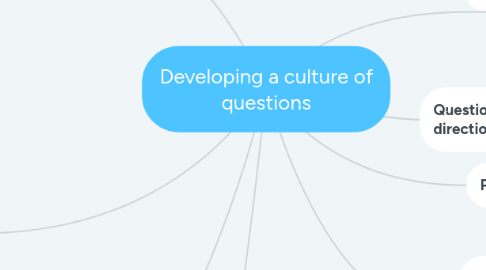
1. The learner
1.1. Learner Profile
1.1.1. inquirers-communicators- thinkers
1.2. Exhibition
1.2.1. "When students undertake the PYP exhibition, they are the architects of their own inquiries, posing and pursing their own open-ended questions." LT-7.4
1.3. Agency
1.3.1. "If we truly want to support student agency we need to listen to what they say and give them time to process their initial ideas, so that they may ask questions that are challenging, significant, engaging, and relatable." LT-7.4
1.3.2. Students'questions are important and valued- Voice
1.3.3. "Having the confidence to put aside a planned learning engagement to explore student questions will ultimately lead to higher levels of engagement and understanding as the drive for learning has come from the students." LT-7.4Choice/ownership
2. Learning and Teaching
2.1. Concepts
2.1.1. using the concept-question cards to identify concepts and organize questions into a conceptual grid to see where questions take us
2.2. ATL
2.2.1. Thinking skills
2.2.2. Research skills
2.2.3. Communication skills
2.3. Inquiry
2.3.1. "Our role in this is to ensure the questions link back to the central idea." LT-7.4
2.4. Language
2.4.1. question structure
3. A community of learners
3.1. Technology
3.1.1. tools to help with collaboration
3.2. learning environment
3.2.1. engaging
4. Capabilities
4.1. Build and maintain collaborative relationships
4.1.1. negotiate ideas and understandings with colleagues and other members of the learning community
4.1.2. provide opportunities for student collaboration.- Through inquiring into questions
4.2. design inquiries using local and global context
4.2.1. support students to initiate and engage in their own inquiries
4.3. build/develop conceptual understanding within and across subjects
4.3.1. integrate transdisciplinary and disciplinary concepts, knowledge, and skills in a way that supports a coherent learning experience for students
4.3.2. use key concepts as a tool for inquiry. (Asking and sorting questions)
4.4. undertake personal inquiry, reflection and action to inform their practice
4.4.1. critically engage with professional literature and experiences to reflect on and refine learning and teaching
4.5. foster supportive environments that remove barriers to learning
4.5.1. select teaching approaches, resources, technologies, learning and assessment activities that are inclusive and effective for diverse students

